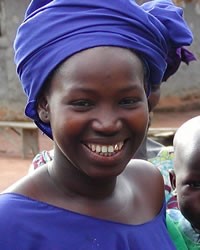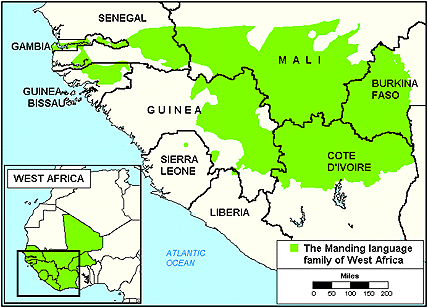Malinke people are also called Maninka, and you will see them referred to either way. Like other major people groups, the Maninka have subgroups and different dialects. The Eastern Maninka in Liberia, for example, speak the Eastern Maninkaka dialect. Many of these people live in Liberia. Most Eastern Malinke can trace their roots back to the once great Mali Empire. This empire was created by several Mandinka clans in the second millennium. It grew in power in the thirteenth century under the rule of Sundiata, the "lion king," who unified the kingdom and began to conquer surrounding peoples. In the fifteenth century, Portuguese explorers reached the coast and began trading in slaves and ivory.
The Eastern Maninka in Liberia are mainly full-time subsistence farmers. Rice is an important staple crop, along with millet, sorghum and peanuts. When they have time, the men are also involved in other activities. Some have small part-time businesses to supplement their incomes. They may keep goats, sheep, bees, poultry, and dogs. In addition, they keep cattle as bride-price payments or for sacrifices. Men usually do the heavy farm work, while the women do both domestic and farm chores. Women have the jobs of cooking, cleaning, tending to the young children, and gathering forest products. Men are usually responsible for hunting, fishing, and holding leadership positions, such as headmen or imams (religious leaders). The Eastern Maninka are a patrilineal society, with the oldest male as the leader of the lineage. A "minor lineage" consists of a man and his immediate family. A "major lineage" is made up of the houses of brothers and their families. The next larger unit is the village settlement, which contains the houses of men of the same clan name. The men of one village attend ritual meetings together. Traditionally Eastern Maninka marriages were arranged when the girl was still an infant. Today, marriages are still arranged, but not so early. The groom must give premarital and post-marital bride-service to the bride's family in addition to paying a bride-price. There is unlimited polygamy (having multiple wives) among the Eastern Maninka, but men rarely have more than three wives. There are three divisions within Maninka society: those who are free-born, the artisans, and the slaves. The free-born class originally consisted of Maninka nobility. Today, it consists of farmers, merchants, Muslim clerics, and others. The artisan class includes blacksmiths, leather workers, and griots (praise singers). Artisans are revered for their expertise and craft secrets, which involve spiritual rituals; therefore, they are looked upon with fear and awe. Griots are important members of society because they are responsible for passing down the oral traditions and cultural heritage of the Maninka. The Eastern Maninka people believe in upholding human dignity. They regard selfishness and a lack of hospitality are the two deadliest sins that defile this dignity.
When foreign merchants came to Africa, they brought Islam with them. The religion blended with the Eastern Maninka's traditional religious practices and today, this blending of religions is still evident. It is not uncommon for an Eastern Maninka to first pray in the village mosque and then sacrifice a chicken to the spirits. Healing, magic, and divination are important parts of their form of Islam. Many people consult marabouts (holy men) for healing, protective charms or insight into the future. Marabouts can also be consulted to put a curse on an enemy. Educated Eastern Maninka may conceal their belief in magic, but there are very few who do not possess a charm or amulet of some sort.
Prayer is the first step towards seeing a full movement to Christ among them.
Pray for the Lord to bless the Eastern Maninka's harvests in Liberia as a testimony of his sovereignty and goodness. Pray for Eastern Maninka leaders to open the door to Christ's ambassadors. Pray for the Lord to thrust out Holy Spirit anointed workers among the Eastern Maninka people. Pray for a powerful Disciple Making Movement among every Maninka people.
Scripture Prayers for the Maninka, Eastern in Liberia.
| Profile Source: Joshua Project |












